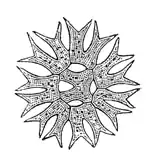Parapediastrum
Parapediastrum is a genus of green algae in the family Hydrodictyaceae.[1] It is fairly common in freshwater regions throughout the world.[2]
| Parapediastrum | |
|---|---|
 | |
| Scientific classification | |
| (unranked): | Viridiplantae |
| Division: | Chlorophyta |
| Class: | Chlorophyceae |
| Order: | Sphaeropleales |
| Family: | Hydrodictyaceae |
| Genus: | Parapediastrum E.Hegewald, 2005 |
| Species | |
| |
Parapediastrum forms flat, disc-shaped colonies, termed coenobia, of cells in powers of two, usually four, eight, 16, or 32. Marginal cells are divided into two lobes, which are each further divided into two lobes, making four lobes total. This distinguishes it from Pediastrum and other genera, which have marginal cells with one or two lobes that are never subdivided further. Internal cells are two- or four-lobed. There are inter-cellular spaces between the cells. Cells have one chloroplast filling the cell, each with a single pyrenoid.[3]
In 2005, molecular phylogenetic analyses showed that Pediastrum sensu lato was paraphyletic with respect to Hydrodictyon. Therefore, Pediastrum was split up into several genera, including Parapediastrum.[4]
References
- See the NCBI webpage on Parapediastrum. Data extracted from the "NCBI taxonomy resources". National Center for Biotechnology Information. Retrieved 2007-03-19.
- McManus, Hilary A.; Lewis, Louise A. (2011). "Molecular Phylogenetic Relationships in the Freshwater Family Hydrodictyaceae (Sphaeropleales, Chlorophyceae), with an Emphasis on Pediastrum duplex". Journal of Phycology. 47 (1): 152–163. doi:10.1111/j.1529-8817.2010.00940.x. PMID 27021721. S2CID 20549311.
- Bicudo, Carlos E. M.; Menezes, Mariângela (2006). Gêneros de Algas de Águas Continentais do Brasil: chave para identificação e descrições (2 ed.). RiMa Editora. p. 508. ISBN 857656064X.
- Buchheim, Mark; Buchheim, Julie; Carlson, Tracy; Braband, Anke; Hepperle, Dominik; Krienitz, Lothar; Wolf, Matthias; Hegewald, Eberhard (2005). "Phylogeny of the Hydrodictyaceae (Chlorophyceae): Inferences from rDNA Data". Journal of Phycology. 41 (5): 1039–1054. doi:10.1111/j.1529-8817.2005.00129.x. S2CID 83698514.